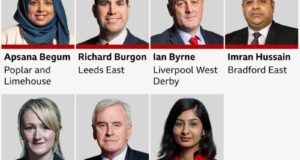
A Brexit deal has been agreed between the UK and EU before a meeting of European leaders in Brussels.
Boris Johnson and Jean-Claude Juncker called it a “fair” outcome – and the EU Commission President said there was no need to extend the Brexit deadline.
He said: “We have a deal so why should we have a prolongation.”
This will be a boost for the PM, but he still faces a battle to get the deal through Parliament with ex-allies the DUP opposing it.
Mr Johnson has insisted the UK will leave the EU on 31 October and he urged MPs to “come together to get Brexit done and get this excellent deal over the line”.
He added: “Now is the moment for us to get Brexit done and then together to work on building our future partnership, which I think can be incredibly positive both for the UK and for the EU.”
Brexit should happen “without any more delay”, he added, so that the government could turn its attentions to domestic priorities.
The two sides worked round-the-clock on the legal text of the deal, but it will still need the approval of both the UK and European parliaments.
In a statement, the Democratic Unionist Party, which the government relies on for support in key votes, said: “These proposals are not, in our view, beneficial to the economic well-being of Northern Ireland and they undermine the integrity of the Union.”
They added: “Saturday’s vote in Parliament on the proposals will only be the start of a long process to get any Withdrawal Agreement Bill through the House of Commons.”
Labour leader Jeremy Corbyn said the deal sounded “even worse” than what was negotiated by the PM’s predecessor, Theresa May, and “should be rejected” by MPs.
MPs have voted to hold an extra sitting in the Commons on Saturday to discuss the next steps.
Cabinet Office minister Michael Gove said the government would hold a vote on the deal.
He said he was “not contemplating defeat”, but if the plan did not get the backing of MPs, the alternative was leaving without a deal.
The DUP has been in an agreement with the Conservative Party since the 2017 election, which, in the past, gave the government a working majority.
But after resignations and the removal of the party whip from more than 20 Tory MPs in recent weeks, Mr Johnson now could face a tough battle to get his deal through Parliament.
EU chief negotiator Michel Barnier said he and Mr Juncker had been told by the PM “he has faith in his ability to convince the majority he needs in the House of Commons”.
MPs passed a law in September that requires the PM to request an extension on 19 October if Parliament has not agreed a deal or backed leaving without a deal by that date.
While Boris Johnson may have a deal in Brussels, he absolutely does not have a deal in Westminster.
The DUP isn’t prepared to back this package because it does not give it a veto over the new customs arrangement, which it fears could threaten Northern Ireland’s position in the United Kingdom.
Team Johnson hopes that, by presenting this as a choice between Mr Johnson’s deal and no-deal, the DUP will buckle.
But the DUP doesn’t blink easily, and if it doesn’t, the signs are Mr Johnson could be defeated on Saturday, when the party’s 10 votes could be critical.
That could trigger the Benn Act, forcing a lengthy delay, and could encourage some opposition MP to trigger a motion of no confidence, paving the way for a general election.
It’s going to be a titanic tussle on Saturday.
What is in the deal?
Most of the deal is the same as the one agreed by Theresa May last year – the main change is the Northern Ireland proposals.
- The UK will continue to abide by EU rules until the end of 2020, and possibly longer, to allow businesses to adjust
- The UK will still pay an estimated £39bn “divorce bill”
- The rights of EU citizens living in the UK, and UK citizens in the EU, will be guaranteed
- Northern Ireland will be aligned to the EU single market
- The controversial “backstop”– that critics feared could have kept the UK in a customs union with the EU indefinitely – has been removed
- Northern Ireland will instead remain a part of the UK’s customs territory, so it will be included in any future trade deals struck by the government after Brexit
- But Northern Ireland will also remain an entry point into the EU’s customs zone. The UK will not apply tariffs to products entering Northern Ireland as long as they are not destined for onward transportation across the border
- A joint EU/UK committee will decide which goods are at risk of entering the single market and the UK will collect EU tariffs on them on behalf of the EU
- The Northern Ireland Assembly – which has been suspended since January 2017 – will get a vote every four years on whether to continue with the new trading arrangements
- The decision would be based on a simple majority, rather than requiring a majority of both unionists and nationalists to support the rules in order for them to pass
In a statement, the Democratic Unionists said Northern Ireland’s main East-West trade route would still be subject to EU customs rules, “notwithstanding that Northern Ireland will remain part of the UK customs territory”.
“All goods would be subject to a customs check regime regardless of their final destination,” the statement added, and the plan for a joint EU/UK committee would give the EU a “veto” on which goods would be exempt from tariffs or not.
“This is not acceptable within the internal borders of the United Kingdom,” the DUP said.
They expressed concerns Northern Ireland consumers would face increased costs and less choice, and Northern Ireland would also be subject to different VAT arrangements to the rest of the UK.
“Some progress” had been made on democratic consent for the deal, it went on, but the idea of giving the Assembly a vote on the new arrangements that could be won by a “simple majority” violated the Good Friday Agreement, which demands the backing of both unionists and nationalists.
Leader of the Commons and Brexit supporter Jacob Rees-Mogg said it was a “really exciting day today in British politics” as he urged MPs to “rally round this great deal”.
But Brexit Party leader Nigel Farage called for it to be rejected by Parliament, saying it would mean “we will not be making our own laws in our own country” and said the treaty “binds us in to other commitments”.
Liberal Democrat leader Jo Swinson also condemned the deal as “bad for our economy, bad for our public services, and bad for our environment”.
The pro-Remain MP said the “fight to stop Brexit is far from over”, adding: “The next few days will set the direction of our country for generations, and I am more determined than ever to stop Brexit.”
 Weekly Bangla Mirror | Bangla Mirror, Bangladeshi news in UK, bangla mirror news
Weekly Bangla Mirror | Bangla Mirror, Bangladeshi news in UK, bangla mirror news







